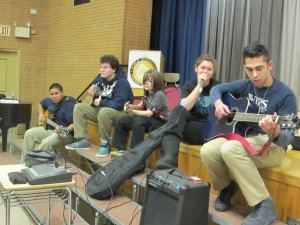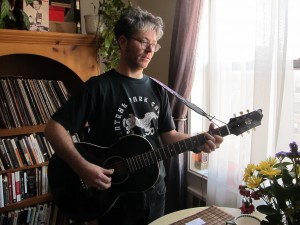Twelve-year-old James O’Neill perched next to his older brother, Will, strumming his guitar during lunch hour at World Journalism Preparatory School in Queens on a recent Friday in April. His shaggy brown hair fell over his eyes as he bobbed his head to “Should I Stay, or Should I Go,” by The Clash. A handful of other students unpacked guitars and drumsticks, getting ready to join in.

This lunchtime music club taught by a volunteer teacher is as good as it gets for the sixth through 12th graders in the Flushing school. It has no money to fund music classes in the school. The city has proposed cutting after school funds as well for next year.
“Schools have to meet art and music requirements,” said World Journalism Prep Principal Cynthia Schneider. “We meet our art requirement through our journalism curriculum and publication, but we have no budget for music. We have really talented kids here, but one of the things that kids give up when they go to a small school, is they give up the comprehensiveness of the large schools. The jam session on Fridays is the one outlet we have because we have one teacher who volunteers his lunchtime to do that.”
English teacher Vincent Cross instructs kids on his own time in blues rhythms and bluegrass, while jamming with them on his guitar. His mass of untidy curls obscures his face as he bobs to the students’ beat.
Cross came to World Journalism Preparatory after bouncing around the street musician circuit in London over a decade ago—an Irish youth, playing guitar. He said he doesn’t much mind donating his time to the cause of carving out some time for students to explore their musical ambitions, in unconventional ways.
And the jam sessions provide a safe place for unconventional students. “It took me a long time to get used to this school,” said James, as he put away his guitar. He said he used to get bullied because of his long hair. But once he realized the music interludes were for real, “it was the new ‘Call of Duty’ for me.” He was referring to the video game he plays an hour a day, until his mom tells him to put it away. The sedentary game time has now been replaced with practicing guitar.

Cross often brings in a few of the guitars he picked up at garage sales or on the streets, so students who don’t own an instrument can still jam along. One of his colleagues donated a drum set so that Vincent Ganpat, 17, could practice. Ganpat had been drumming since 8th grade when he found out about the music club through the school newspaper.
“Certain songs require certain beats,” Ganpat said, as he reflected on what he’s learned in the club so far. “I thought you could just use the same repetitive beat, but the drummer’s job is to make the sound fit. And in order to do that, you have to listen to how you’re playing and listen to everyone else.”
Nadine Cavanaugh, 17, was reluctant to join the group because she didn’t play an instrument. But she can sing, and she remains the only singer in the band. She looks forward to the Friday sessions, because she feels like she finally found a place where she belongs.
“I don’t have to refrain from being myself because other people won’t appreciate it,” she said, as she described how her involvement in the club has helped her feel socially accepted. “I was always the weird one. I’ve had Asperger syndrome since I was young. I’m the in-your-face kind of person, and that’s how I bond with people. Some people take it fine, and some can find it hard to handle.”
Cross knows something about being an outsider. Raised as an Irish immigrant in Australia until he was 10, he returned to his homeland only to be bullied at an all-boys Catholic elementary school for losing his Irish accent. Living in an apartment above his family’s pub, Cross fell in love with the records his parents had tossed away from the jukebox. While his classmates were grooving to 1980s pop songs, he was enjoying tunes from the 1950s. As if that weren’t odd enough, this Australian-Irish lad’s favorite music was pure Americana: bluegrass.
The hip 41-year-old journalism and English teacher received little support as a young, iconoclastic musician, so he wants to offer his students the opposite.
“They’re entering a musical journey, and I’d like to send them on their way,” Cross said. “Music brought things out and allowed me to access a deeper dimension of myself.”




It’s for difficult for Aspergers teens and adults to mix up in their society because society don’t consider aspergers people as the normal people.
After reading your post i got the thing that these children can also get success if and only if they have trust on themselves.
It’s time for changing our mentality that people with Aspergers are dumb!
Reference: Cluas Aspergers Treatment